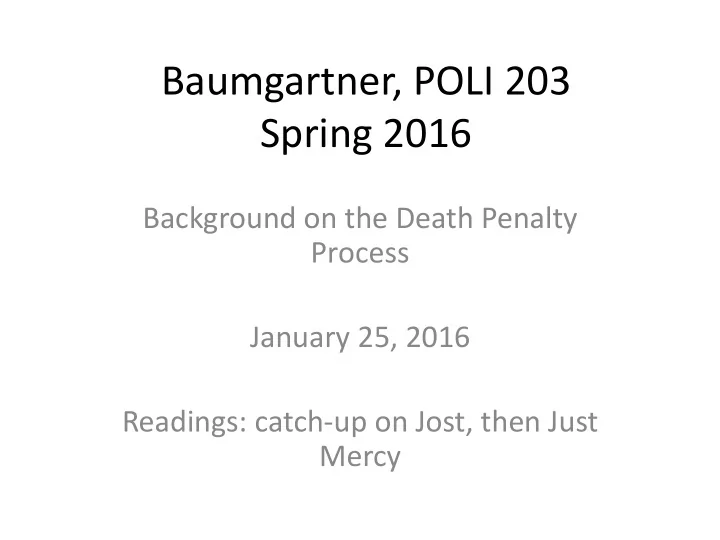

Baumgartner, POLI 203 Spring 2016 Background on the Death Penalty Process January 25, 2016 Readings: catch-up on Jost, then Just Mercy
Catch-up from last week • NC reforms reducing use of DP • NC methods of execution • Issues Pro and Con
Big reforms reducing the DP in NC • 1994: LWOP is the alternative to DP • 2000: creation of Indigent Defense Services • 2001: Prosecutors have discretion to seek DP • 2002: no DP for mentally retarded (before US SC does same thing in Atkins , 2002) • 2005: US SC rules in Roper against DP for juveniles • 2006: Physicians oppose lethal injection, no more executions since then. • 2009: RJA (But: revised 2011, repealed 2013, “Restoring Proper Justice Act” 2015)
NC methods of execution • Before 1910: hangings in front of local court house • 1910: Executions centralized in Raleigh – Electric chair, no longer hangings – Gas chamber later – Lethal injections later – Each innovation an attempt to create a safer, calmer, more humane method – Similar to trends nationally.
Issues (CQ researcher) • Indigent Defense Resources – Last priority of a state legislature: pay for lawyers for guilty people. We are already paying for the prosecution! • Vulnerable populations targeted – Mentally Ill – Mentally Incapacitated (e.g., low IQ) • Innocence / Errors
Issues (continued), Pro-DP Arguments • Retribution is a legitimate goal of justice – Retributivist argument is “just desserts” – some crimes are so terrible the perpetrators deserve death • Incapacitation – Remove the perpetrator, permanently, the only way to ensure no further crimes • Deterrence – Conflicting studies on this topic, National Academy of Science review in 2012 said we should draw no conclusions
Issues (continued) • Local variation – State by state, but also within states – DA’s decide whether to prosecute – Juries cannot be monitored – Strong tradition of “local control” but when does this veer into “arbitrary” or “capricious” if the same crime sometimes does and sometimes does not lead to death? • Recent Chapel Hill killings were in Durham County, just across the border. Death is on the table. Orange County has never had a death sentence…
Issues (continued) • Torture, delays, cancelled, stayed executions – Most death sentences are overturned – Most scheduled execution dates are cancelled, often at the last minute – Is that torture? Schedule your death, then say “oops”? – Many would say this is a positive, who cares if one of these individuals suffers? Justice Scalia: What an enviable death compared to what he inflicted… – On the other hand, do we want the government to do this, on purpose, by design, to torture someone? • Race, Gender of inmate, victim – Female offenders: 10 percent of homicides, but only 15 women have been executed…
Furman, Gregg, and the Constitution • The safeguards in Gregg v. Georgia were supposed to eliminate the deficiencies recognized in Furman . Our question for the semester: has this occurred. • So these questions of “equal protection of the law”, “cruel and unusual” punishments”, and “evolving standards of decency” are key.
Just Mercy • “…them without the capital get the punishment…” (p. 6) • Why is the life of a public defender (or prosecutor) so different than that of a mergers and acquisitions attorney? – Law school saying from way back: “Two kinds of lawyers: social engineers, and … parasites” (ouch!)
Proximity • 1980s to about 2010 or so – Three strikes you’re out – President Clinton, campaigning for office in 1992, suspended his campaign for a day to return to Little Rock for the execution of Ricky Ray Rector, who was so brain damaged by a gun shot wound to the head that he asked to save his pecan pie from his last meal so he could eat it the next day. • You must dehumanize to do these things.
What Defines You? • Think of the best three things you have ever done, things you would like people to about know you, or for your mom maybe to know, to make her proud. • Think of the three worst things you may have ever been involved in. • Now think of the single worst of those. • Are you defined by that single act, forever?
Venue-Shopping and Jury Bleaching • Venue-changing at the discretion of the judge. • Many southern counties are high in Af-Am populations, particularly rural Alabama. Stevenson’s client, Walter McMillan, moved from Monroe County (40% Af-Am) to Baldwin County (on the coast, 9% Af-Am, not to other neighboring counties 40-75% Af-Am) (pp. 59ff) • Judge: Robert E Lee Key… • If the judge believes you to be a “drug kingpin” and he is a crusader in the “war on drugs” then his goal is clear…
Peremptory Strikes and Batson • NC: Each side gets 12 strikes for no cause • However, in Batson v. Kentucky (1986) the USSC said that strikes for purely racial reasons are not allowed. • But what is the standard? • The striking side must proffer a “racially neutral” reason. – Note, it does not have to be reasonable. – The decision has almost never led to a successful challenge – Jury bleaching is currently in front of the USSC, as it is so rampant. All for NC RJA cases won when statistical patterns were considered.
Recommend
More recommend